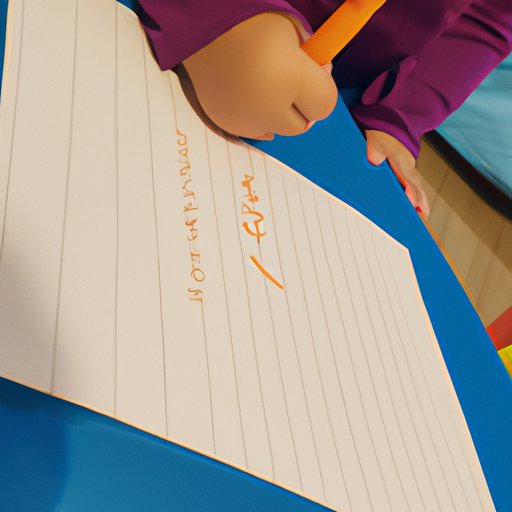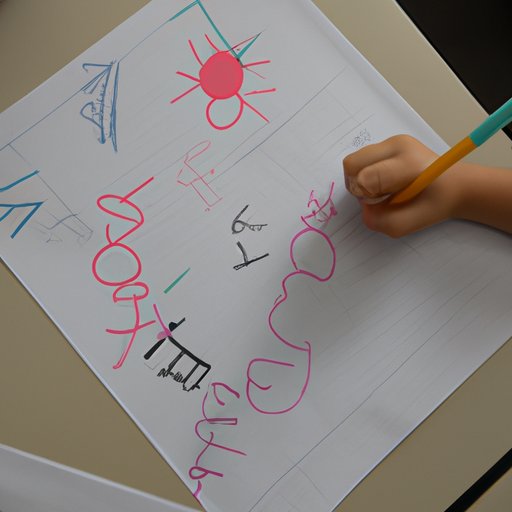Introduction
Writing is an essential skill for success in school and beyond. But when do kids start writing? This article will explore the developmental milestones associated with writing in early childhood, as well as strategies to help parents understand when to expect their kids to start writing. We will also analyze the benefits and challenges of writing for young learners, examine how technology impacts writing development in kids, and investigate different strategies to encourage writing in children.

Exploring the Developmental Milestones of Writing in Early Childhood
The ability to write is a complex process that requires physical, cognitive, and psychological development. In order to understand when kids are ready to start writing, it’s important to consider each of these components. Physical development includes the ability to hold and control a pencil, while cognitive development involves understanding concepts such as letters, numbers, and shapes. Psychological development involves being able to focus on a task and follow instructions.
Research has shown that children typically begin to develop the skills necessary for writing at around three years old. At this age, they may be able to draw simple pictures, trace lines and circles, and imitate letters. By four years old, they may be able to form some letters and recognize their names. By five or six years old, they may be able to write simple words and sentences.
Helping Parents Understand When to Expect Their Kids to Start Writing
It’s important for parents to understand that every child develops differently. While some children may be ready to start writing as early as three years old, others may take longer. It’s important to allow children to develop at their own pace and set realistic expectations for them. Encouraging children to write from a young age can help to foster a lifelong love of writing.
Analyzing the Benefits and Challenges of Writing for Young Learners
Writing can be a powerful tool for young learners, helping them to express themselves, build confidence, and develop critical thinking skills. Writing can also help children to better understand language and develop stronger reading comprehension skills. However, writing can also be challenging for young learners, as it requires a great deal of focus and concentration.
Examining How Technology Impacts Writing Development in Kids
Technology has drastically changed the way children learn to write. Digital tools such as word processing programs, video games, and tablet applications have made it easier for children to develop their writing skills. However, there is also the potential for technology to limit or even hinder writing development in kids. For example, relying too heavily on spell check and auto-correct features could limit a child’s ability to learn proper spelling and grammar.

Investigating Different Strategies to Encourage Writing in Children
Encouraging writing in children can be a challenge, but there are many strategies that can help. Using creative activities such as storytelling, drawing, and acting can make writing fun and engaging. Parents can also introduce writing through books and other educational materials, such as alphabet cards, word puzzles, and writing prompts.

Teaching Tips for Building a Strong Foundation in Writing Skills
Once children have developed the physical, cognitive, and psychological skills necessary for writing, parents can use a variety of teaching techniques to help them build strong writing skills. Developing strong handwriting skills is essential, as is learning good grammar and syntax. It’s also important to teach children how to edit and revise their work. Finally, providing feedback and encouragement can help to foster a positive attitude towards writing.
Conclusion
Writing is an essential skill for success in school and beyond. This article has explored the developmental milestones associated with writing in early childhood, as well as strategies to help parents understand when to expect their kids to start writing. We have also analyzed the benefits and challenges of writing for young learners, examined how technology impacts writing development in kids, and investigated different strategies to encourage writing in children. Teaching tips for building a strong foundation in writing skills have been discussed, as well as recommendations for further resources. By understanding when kids are ready to start writing, and using creative strategies to encourage writing, parents can help ensure their children develop a strong foundation in writing skills.
(Note: Is this article not meeting your expectations? Do you have knowledge or insights to share? Unlock new opportunities and expand your reach by joining our authors team. Click Registration to join us and share your expertise with our readers.)
